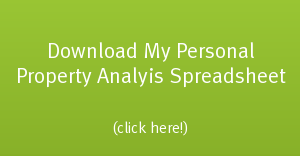This article is part two in a four part series on Getting Started Investing In Real Estate (to read part one, click here). Last time I discussed the important of building upon a solid foundation before jumping into the investing game. I cannot stress enough the value of getting a firm grasp on real estate fundamentals before buying your first property. However, you don’t want to live in a perpetual state of learning forever. Education is only as good as the results it produces. It’s time to make a detailed plan on how to put that education into action.
Many investors skip step two and instead just jump right into buying their first property. This is not only a decision that will cause years of aimless wandering and untold headaches, but also marital stress, wasted money, and financial bankruptcy. Do not skip step two. Instead, grab some paper and a pen and lets get started. Yes, literally go grab that pen and paper. I’ll be here when you get back. Five years from now you will thank me.
Defining Your Goal:
Answer for yourself the following question:
How much money would you need to live comfortably if you didn’t have a job? _________
The answer to this question is your minimum monthly income. This is the amount of money you need to quit your job and begin living life on your terms. To define your investment plan, you need to divide this number by 100 (more on why later). This is your minimum number of units you will need to obtain. For example, if I needed $5000 a month to live comfortably (the average US Household makes around $4250 per month), I would divide $5000 by 100 to discover I need 50 units to live comfortably. This number is now my minimum number of units.
Write out the following statement on your paper:
My Investment Goal is to Produce __________ in monthly passive cashflow by purchasing _______ units over the next _______ years.
This is your goal. It is Specific, Measurable, Attainable, Relevant, and Timely (SMART).
Defining Your Criteria:
Why do we divide by 100? This is the minimum amount of positive cashflow per unit you need each month in order to justify a potential property. This is your most basic criteria when determining what separates a “good deal” from a “bad deal”. Does the property produce $100 per month in income after all expenses are paid out? This includes the percentage set aside for when the unit is vacant, in need of repairs, evictions are required, etc.
For example, one of my properties is a triplex (three units). The total monthly payment on the mortgage is just under $500 per month including taxes and insurance. Other expenses (such as a 5% vacancy rate, repairs, lawn care, property management, etc) add an additional $300 per month in expenses for total expenses of $800 per month. Total income on this property is around $1300 per month, leaving $500 per month in positive cashflow. This equates to $166.66 per unit per month in cashflow. Does it meet my minimum requirement? In the words of my Minnesota heritage, “Ya, sure, ya betcha!”.
“But I could never find a deal this good!” Depending on where you live in the country, this minimum criteria may be easy or difficult to obtain. In my area of Western Washington State, this number is easily attainable and often times investors require $200 per month cashflow. If you live in an area where prices are significantly higher (such as Southern California, Seattle, Boston, Chicago, or other major metropolitan areas) you can still find properties that meet this criteria. You will just need to search harder, make more offers, and look outside the city a little further.
This is it. Of course, your investment plan will grow as you determine more and more of what you are interested (or not interested) in. Do you like two-bedroom apartments or studios? Do you like new construction or remodeling? Do you want to manage your own properties or hire a property manager? These are important questions, but broken down to it’s most basic parts, your goal is to produce enough income to free yourself. Its your job to now make your plan a reality. Its time to purchase your first property.
Leave me a comment below and then click here to read part three of “Getting Started Investing in Real Estate.”
P.S. looking for hard money loans in California? Be sure to check out my friends over at northcoastfinancialinc.com. They have very competitive rates, can fund within a week and specialize in fix and flip loans and other hard money loans.
 If this is your first time here at Real Estate In Your Twenties.com - welcome!
If this is your first time here at Real Estate In Your Twenties.com - welcome! 





